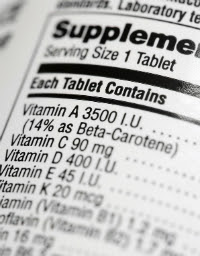 In light of recent news reports coming out with startling statements about supplements, it is worth pointing out that just because it is a supplement, does not mean it is always safe. NPR recently posted an article about the number of ER visits due to supplement use/misuse. Though I feel this was faulty representation and does not mention the number of ER visits due to pharmaceutical use/misuse, it nevertheless makes the point that supplements too, can be dangerous if we aren’t informed. Recent studies (conducted by independent labs, scientists, and/or newspapers) in which dietary supplements (DS) were randomly and independently tested have shown that DS products do not always contain the ingredients (or the purity of ingredients) stated on the product label. This concern goes across all supplements: vitamins, minerals, herbs/botanicals, and amino acids.
In light of recent news reports coming out with startling statements about supplements, it is worth pointing out that just because it is a supplement, does not mean it is always safe. NPR recently posted an article about the number of ER visits due to supplement use/misuse. Though I feel this was faulty representation and does not mention the number of ER visits due to pharmaceutical use/misuse, it nevertheless makes the point that supplements too, can be dangerous if we aren’t informed. Recent studies (conducted by independent labs, scientists, and/or newspapers) in which dietary supplements (DS) were randomly and independently tested have shown that DS products do not always contain the ingredients (or the purity of ingredients) stated on the product label. This concern goes across all supplements: vitamins, minerals, herbs/botanicals, and amino acids.
To complicate matters, manufacturers of DS are not currenlty required to submit products to the scientific scrutiny of the FDA because DS are regulated as a food product, not a drug. The Federal Trade Commission regulates advertising of product claims, this is why you see “this product was not intended to treat or cure…” on the labels, but that has nothing to do with the purity and quality of the pill you’re taking. The FDA has the authority to spot-check supplements (and to remove products that violate certain regulations) but is not required by law to test, or require testing, on all over-the-counter supplements.
Several private groups, as well as the Government Accountability Office (Natural Resources and the Environment Division) want more done to hold supplement makers accountable for the purity of their products. It’s a heated debate, but as more clinicians, consumers, and retailers call for standardized practices for testing, producing, and marketing DS before they go on the market, the more confident we all can be about what we’re buying.
It is important to be an informed consumer:
- Read labels and understand what the terms on the label actually mean (See Diagram). Ingredients you don’t want to see include fillers, dyes, lead, dextrose, titanium dioxide, and magnesium stearate.
- If it sounds too good to be true, chances are, it probably is
- Look for a Quality Assurance seal of approval: Good Manufacturing Practices (GMP) and the U.S. Pharmacopeia (USP).
- Purchase products from your healthcare provider or a reputable company.
- Research the product / company on the Internet: National Center for Complementary and Alternative Medicine (NCCAM). Look for product recalls and scams: FDA Health Fraud Scams & Tainted Supplements.
Your best source of educational support is your health care practitioner. Particularly a healthcare provider that is educated in nutraceutical use!

